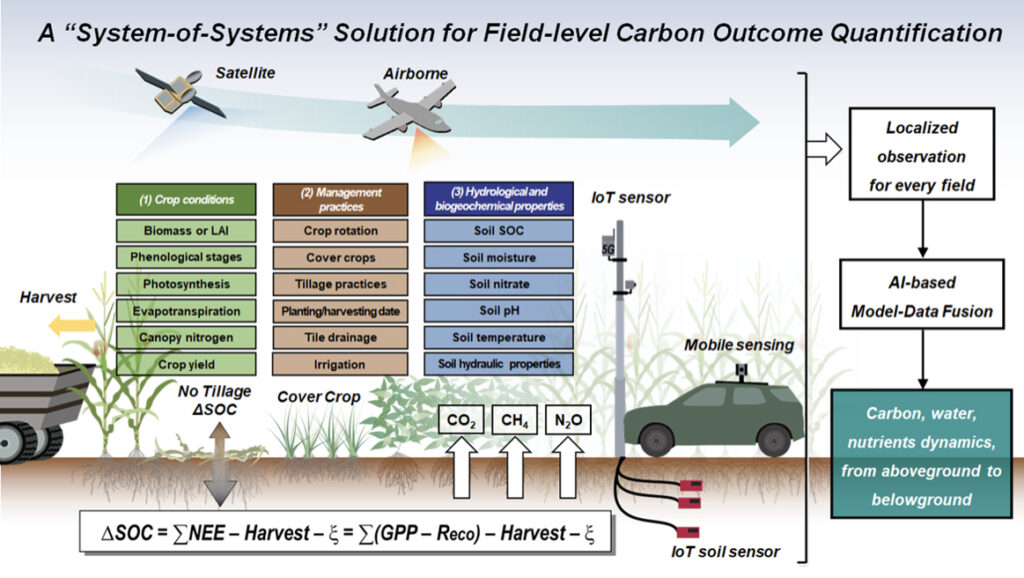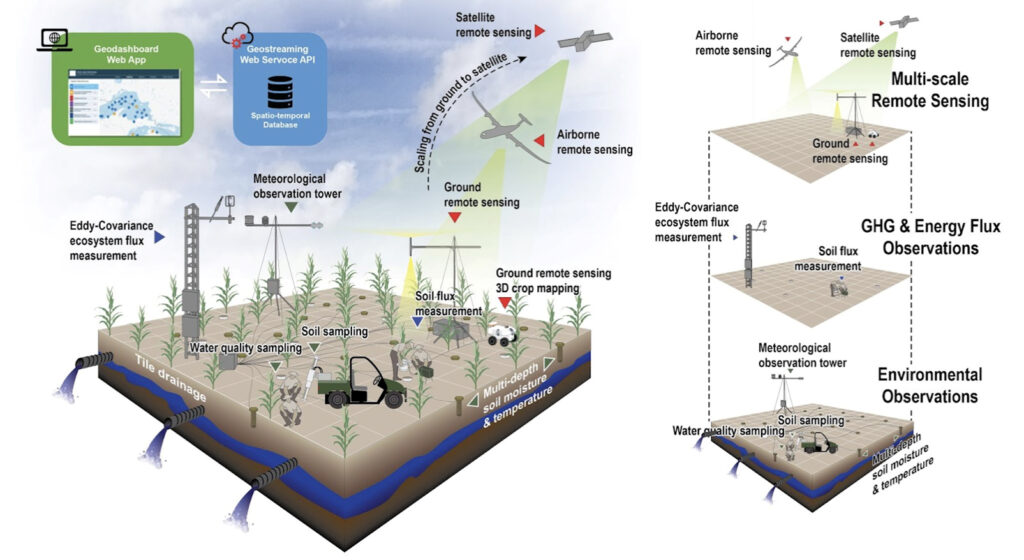Research Themes
The agroecosystem plays an important role in the regional and global carbon cycle. Carbon dioxide is drawn down from the atmosphere by plant photosynthesis and turned into different plant carbon pools and products. Plant carbon input from residue and root exudates further drives soil carbon dynamics and microbe-mediated transformation. Carbon cycling is also directly linked with greenhouse gas emissions (N2O and CH4) from the agroecosystem. Accurate carbon accounting for the agroecosystem is therefore the foundation for climate-smart agriculture.
Core Faculty and Researchers
Kaiyu Guan, Evan Delucia, Andrew Margenot, Carl Bernacchi, DoKyoung Lee, Bin Peng, Sheng Wang
Representative Projects
High-resolution quantification of tillage impacts on crop production and environmental sustainability (funded by USDA NIFA)

Team members: Bin Peng, Kaiyu Guan, Sheng Wang, with collaborators from University of Minnesota and Indiana University
Tillage is an essential farming practice that is closely tied to production cost, crop yield, and environmental sustainability. The U.S. Midwest has seen a recent trend of shifting from conventional tillage to more conservative tillage (e.g., no-till), though the adoption rate of no-till is still low (~35% by 2017) and its change is relatively stagnant. However, there is still no consensus in the existing scientific literature about the impacts of changing tillage practices on crop production and environmental sustainability, mainly because of the spatially varying soil, weather, and management conditions. In this proposal, we aim to innovatively integrate meta-analysis, airborne and satellite data, and process-based modeling to conduct high spatiotemporal assessments of tillage impacts on crop productivity and environmental sustainability (soil carbon sequestration, GHG emissions, and water quality) in the U.S. Midwest. The following four major Midwest states will be included as our study domain: Illinois, Indiana, Iowa, and Minnesota.
System-of-Systems solution to quantify field-level carbon outcomes (funded by DOE ARPA-E SMARTFARM)
 Team members: Kaiyu Guan, Wendy Yang, DK Lee, Evan DeLucia, Carl Bernacchi, Bin Peng, Sheng Wang, and partners from University of Minnesota, DOE Berkeley Lab, University of Buffalo
Team members: Kaiyu Guan, Wendy Yang, DK Lee, Evan DeLucia, Carl Bernacchi, Bin Peng, Sheng Wang, and partners from University of Minnesota, DOE Berkeley Lab, University of Buffalo
Accurate and rapid field-level quantification of Carbon Intensity (CI) at a regional scale is critical to facilitate adoption of new technologies to increase crop productivity and reduce its carbon footprint. This project will develop a commercial solution, SYMFONI, to accurately and cost-effectively estimate SOC and N2O simultaneously on a per-field basis, with the capability to perform these estimates for a large geographic region. SYMFONI is a “system of systems” solution that deeply integrates airborne-satellite remote sensing, process-based modeling, deep learning, atmospheric inversion, vehicle-based mobile sensing, and high-performance computing. The technology innovation and commercial solution from this project build the foundation for accurate carbon accounting in climate-smart agriculture and scientifically rigorous measurement, reporting, and verification (MRV) in the emerging agricultural carbon market. See more details at https://sustainability.illinois.edu/research/smart-farms-project/
Midwest Bioenergy Crop Landscape Laboratory (MBC Lab) – to collect gold-standard GHG and soil carbon data to enable carbon intensity quantification (funded by DOE ARPA-E SMARTFARM Program)
 Team members: Kaiyu Guan, Carl Bernacchi, DK Lee, Jong Lee, Evan DeLucia, Bin Peng, Sheng Wang
Team members: Kaiyu Guan, Carl Bernacchi, DK Lee, Jong Lee, Evan DeLucia, Bin Peng, Sheng Wang
Developing scalable, accurate and cost-effective approaches to quantify field-level Carbon Intensity (CI) is essential for climate smart agriculture. To achieve this goal, the first step is to establish open-source and high-resolution benchmark datasets to support testing emerging monitoring technologies. However, existing field observation sites/networks lack state-of-the-art equipment and missed the opportunities of using advanced remote sensing data to monitor field-level greenhouse gas emissions and CI. MBC-Lab targets collecting carbon-intensity related variables such as soil organic carbon data, topographical data, soil pH, airborne hyperspectral imagery, satellite Earth observation, and other data from soil sensors, soil chambers, and eddy flux covariance towers. MBC-Lab is the perfect testbed for measuring emissions from biofuel production, and this platform will provide data and technology that can be applied to existing markets and broader production agriculture for ‘smart farming’ and environmental sustainability. See more details at https://sustainability.illinois.edu/research/smart-farms-project/
